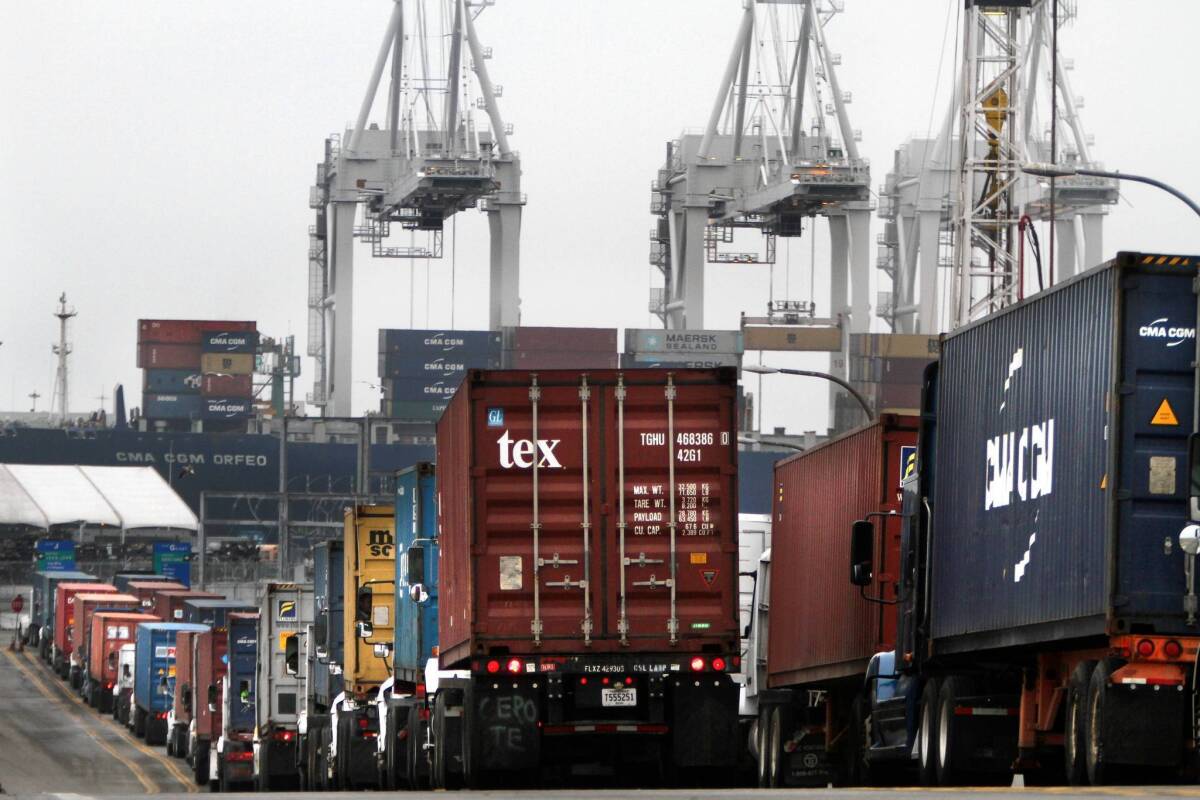Southland ports could see more tax revenue

- Share via
WASHINGTON — The ports of Los Angeles and Long Beach are in an unusual position in today’s era of Washington austerity: They could soon receive more federal money.
A bill sent to the Senate by a committee chaired by Sen. Barbara Boxer (D-Calif.) seeks to address a long-standing California gripe: Its ports receive pennies back for every dollar raised by a tax on cargo.
The measure would nearly double, to about $1.6 billion a year, funding for harbor maintenance nationwide, give priority to the busiest ports and expand the use of the money to include work that the Los Angeles and Long Beach ports are eager to undertake.
It’s too early to say how much the ports could receive. But the Port of Los Angeles, which received none of the money in the last three years, hopes to snag $2 million to $5 million a year initially and $10 million to $20 million a year eventually. The Port of Long Beach could not provide a figure.
Despite the arcane subject of port funding, the legislation shows how a committee chair can tailor a measure to benefit his or her state even after Congress has put an end to the controversial practice of lawmakers earmarking funds for pet projects.
Boxer included the language in the broader Water Resources Development Act, describing the changes as a more equitable way to distribute funds generated by the shippers’ tax.
California ports generated $430 million from the tax in fiscal 2011 but received only $54 million back for harbor maintenance. Los Angeles and Long Beach received nothing in 2011. A Congressional Research Service report listed Los Angeles and Long Beach as ports whose customers generate a substantial amount of the tax revenue that is mostly spent on the maintenance of other harbors.
The legislation doesn’t explicitly refer to the Los Angeles and Long Beach ports but will “potentially have a huge benefit” to them, said Steve Ellis of the watchdog group Taxpayers for Common Sense.
“We see this as a big plus,” said Michael R. Christensen, Port of Los Angeles deputy executive director for development — “if it can just make it through” Congress.
The measure could face pushback from senators whose states now receive a larger share of the harbor maintenance funds. Christensen said Sen. Dianne Feinstein (D-Calif.) told him during a meeting that any change to how the funds are distributed could run into opposition from other senators “because they get the benefit of all of this tax collected on goods coming into California.”
Funds are now allocated based on ports’ needs for maintaining the depths and widths of harbors, as recommended by the Army Corps of Engineers. A large chunk of the money has gone in recent years to Gulf Coast ports, which are “relatively expensive to maintain,” according to a Congressional Research Service report.
The Los Angeles and Long Beach ports have not needed money in recent years to maintain their naturally deep harbors. But they would benefit from the legislation because it would expand the use of funds to cover eagerly sought maintenance of channels up to the docks.
Though the legislation is important to California, Boxer said she intended to “make the case that it’s not just about [her] state” and that ports generating cargo taxes should receive an “equitable” share.
Officials at the Los Angeles and Long Beach ports, which handle about 40% of the cargo containers entering the U.S., have argued that port users have a “reasonable expectation” that the money they pay in taxes will return to maintain the harbors they use.
Ultimately, the funding would be subject to Army Corps of Engineers’ recommendations and the annual congressional appropriations process. But California could receive a boost when the issue comes before the Senate Appropriations subcommittee that oversees the port spending, because it is chaired by Feinstein.
The water bill passed the Senate Environment and Public Works Committee unanimously last week. The overall bill, which its supporters portray as a jobs measure, would authorize water projects, including nearly $1 billion to shore up flood protection in the Sacramento area.
More to Read
Sign up for Essential California
The most important California stories and recommendations in your inbox every morning.
You may occasionally receive promotional content from the Los Angeles Times.











